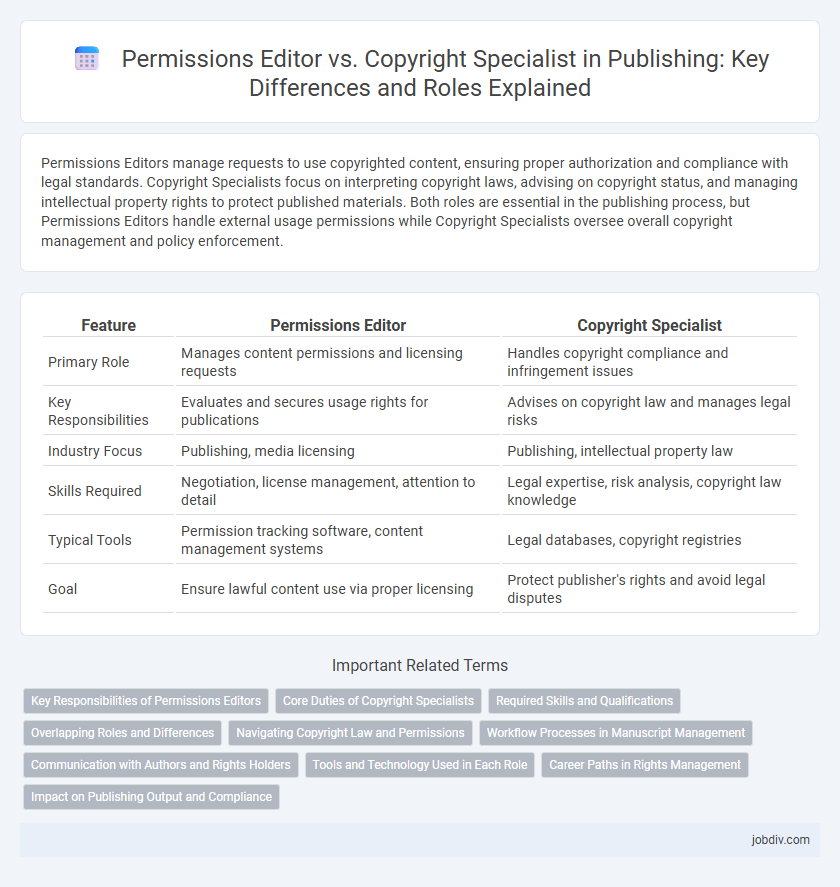Permissions Editors manage requests to use copyrighted content, ensuring proper authorization and compliance with legal standards. Copyright Specialists focus on interpreting copyright laws, advising on copyright status, and managing intellectual property rights to protect published materials. Both roles are essential in the publishing process, but Permissions Editors handle external usage permissions while Copyright Specialists oversee overall copyright management and policy enforcement.
Table of Comparison
| Feature | Permissions Editor | Copyright Specialist |
|---|---|---|
| Primary Role | Manages content permissions and licensing requests | Handles copyright compliance and infringement issues |
| Key Responsibilities | Evaluates and secures usage rights for publications | Advises on copyright law and manages legal risks |
| Industry Focus | Publishing, media licensing | Publishing, intellectual property law |
| Skills Required | Negotiation, license management, attention to detail | Legal expertise, risk analysis, copyright law knowledge |
| Typical Tools | Permission tracking software, content management systems | Legal databases, copyright registries |
| Goal | Ensure lawful content use via proper licensing | Protect publisher's rights and avoid legal disputes |
Key Responsibilities of Permissions Editors
Permissions Editors manage the process of obtaining and tracking rights clearance for content use in publishing projects, ensuring all necessary permissions are secured before publication. They coordinate with authors, copyright holders, and legal teams to review licensing agreements and handle documentation for reproduction rights. Their role is critical for maintaining compliance with intellectual property laws, preventing infringement risks, and facilitating the lawful reuse of published materials.
Core Duties of Copyright Specialists
Copyright Specialists manage rights clearance, secure necessary permissions, and oversee copyright compliance to protect intellectual property. They review contracts, assess risk related to content usage, and ensure legal adherence across publishing projects. Their expertise supports publishers in navigating complex copyright laws and prevents potential infringements.
Required Skills and Qualifications
Permissions Editors require strong copyright knowledge, attention to detail, and proficiency in licensing agreements to manage content use effectively. Copyright Specialists demand expertise in intellectual property law, analytical skills to assess rights clearance, and experience with legal documentation related to publishing. Both roles necessitate excellent communication abilities and a clear understanding of publishing industry standards.
Overlapping Roles and Differences
Permissions editors and copyright specialists both manage rights clearance and ensure legal compliance in publishing projects. Permissions editors primarily handle the authorization to use third-party content, coordinating with authors, publishers, and rights holders, while copyright specialists focus on interpreting copyright law, managing intellectual property portfolios, and addressing infringement issues. Despite overlapping responsibilities in rights management, permissions editors emphasize content usage permissions, whereas copyright specialists concentrate on broader legal protections and enforcement.
Navigating Copyright Law and Permissions
Permissions editors manage the acquisition and clearance of rights needed to use third-party content, ensuring compliance with copyright laws throughout the publishing process. Copyright specialists focus on interpreting copyright legislation and advising on fair use, licensing agreements, and infringement risks to protect intellectual property rights. Both roles require deep knowledge of copyright statutes, contract negotiation, and rights management systems to navigate complex legal frameworks in publishing.
Workflow Processes in Manuscript Management
Permissions Editors streamline manuscript management by securing rights and clearances essential for using third-party content, ensuring compliance with copyright laws and publisher policies. Copyright Specialists focus on interpreting copyright regulations, advising on fair use, and managing author agreements to protect intellectual property and prevent infringement. Both roles integrate into the publishing workflow by collaborating with authors, editors, and legal teams to maintain seamless permissions approval and copyright adherence, optimizing the publication timeline.
Communication with Authors and Rights Holders
Permissions Editors coordinate closely with authors and rights holders to secure clearances for content usage, ensuring legal compliance and timely permissions. Copyright Specialists analyze contracts and licensing agreements, providing detailed guidance on copyright laws and rights management while maintaining transparent communication with stakeholders. Both roles require precise negotiation skills and effective correspondence to protect intellectual property and facilitate content dissemination.
Tools and Technology Used in Each Role
Permissions Editors primarily utilize content management systems (CMS) and rights clearance databases, integrating tools like Rightslink and Copyright Clearance Center (CCC) to streamline license acquisition and permissions tracking. Copyright Specialists rely heavily on legal research software, digital rights management (DRM) tools, and contract management platforms such as ContractWorks or iManage to ensure compliance and protect intellectual property. Both roles increasingly incorporate AI-driven analytics and blockchain technology to enhance accuracy and transparency in rights management and copyright enforcement.
Career Paths in Rights Management
Permissions Editors focus on acquiring and managing rights for content reuse, ensuring legal clearance and adherence to licensing agreements across publishing platforms. Copyright Specialists analyze and enforce copyright laws to protect intellectual property, often advising on compliance and infringement issues within publishing. Both career paths require expertise in rights management, but Permissions Editors lean towards negotiation and permissions acquisition, while Copyright Specialists emphasize legal frameworks and policy enforcement.
Impact on Publishing Output and Compliance
Permissions Editors streamline the acquisition and management of rights, ensuring timely access to third-party content that enhances publishing output without legal delays. Copyright Specialists focus on enforcing copyright laws and securing proper licenses, reducing risks of infringement to maintain compliance. Effective collaboration between both roles boosts content quality while safeguarding publishers against legal challenges.
Permissions Editor vs Copyright Specialist Infographic

 jobdiv.com
jobdiv.com